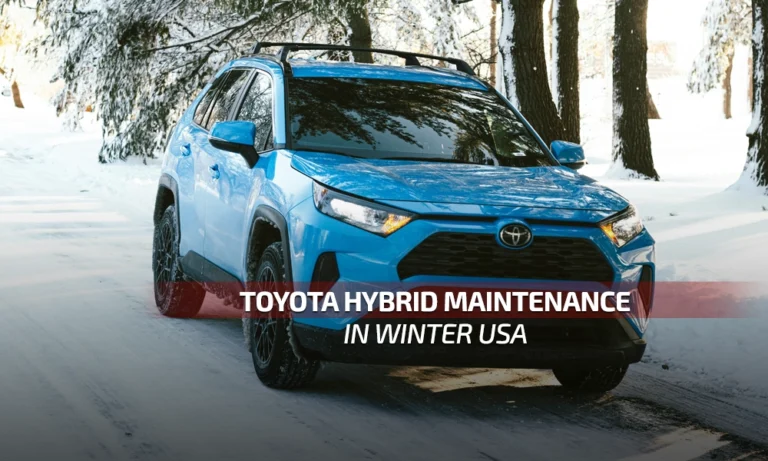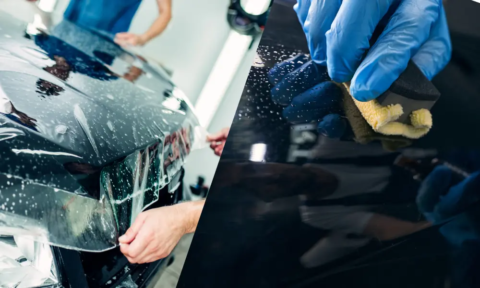Toyota hybrids like the Prius and RAV4 Hybrid are great year-round commuters—but winter driving in the US comes with its own challenges.
If you’re heading into colder months, make sure your hybrid is ready with these essential maintenance tips to keep performance, efficiency, and safety on point.
Cold weather affects battery performance, tire grip, and even fuel economy.
Since Toyota hybrids rely on both gas and electric systems, regular winter prep can prevent breakdowns and improve reliability in snow, slush, or sub-zero temps.
Most Toyota hybrids use nickel-metal hydride or lithium-ion batteries that can handle U.S. winter temps—but performance may drop in extreme cold.
You might notice reduced EV-only range or slower starts.
Parking in a garage or using a battery heater can help.
Should I warm up a hybrid before driving in winter?
Yes. Please do. This is regardless of the weather!
Keep your engines running for a moderate amount of time!
While modern Toyota hybrids, or any hybrids for the matter, don’t need extended idling.
Just start, wait about 30 seconds, and drive gently until the engine warms up.
The hybrid system will self-regulate between electric and gas modes based on temperature.
When you let the engine run for some time, the fluid inside the engine gets to move around.
Ensure your coolant is topped up and rated for sub-zero temperatures.
Also check brake fluid, transmission fluid, and windshield washer fluid (winter mix only).
Many Toyota dealers across the Midwest and Northeast offer seasonal fluid checkups.
Yes—especially in northern states like Michigan, New York, or Colorado.
Toyota hybrids are heavier due to the battery pack, so they benefit from dedicated winter tires for improved traction and braking on ice or snow.
Is regenerative braking affected by snow or ice?
It can be. On slippery surfaces, the regenerative braking system may feel different or engage less aggressively.
Some Toyota models, like the RAV4 Hybrid, switch more braking duty to the ABS system in winter to maintain control.
That being said, I’d advice you to not rely completely on your hybrid’s regenerative braking ability.
Before regenerative braking, people still drove in snow or ice.
Knowing how to brake efficiently in any weather condition is very important for you to know as a driver.
Toyota recommends service every 5,000 to 10,000 miles depending on the model, but during winter, schedule a pre-season check.
Areas like Chicago, Minneapolis, or Denver with harsh winters should consider an early inspection of brakes, tires, battery, and HVAC.
Winter Challenges by Location
- Northeast (e.g., Boston, Philadelphia): Salt exposure leads to faster underbody rust—wash your hybrid regularly.
- Midwest (e.g., Detroit, Chicago): Low temps affect hybrid battery voltage; keep your 12V battery charged.
- West Coast Mountains (e.g., Tahoe, Spokane): Install snow chains only if recommended in your Toyota owner’s manual.
Important Maintenance Tips for Toyota Hybrid Owners During Winter
- Keep the HV battery vents clear of snow or ice.
- Don’t ignore the 12V battery—cold weather can kill it faster than the hybrid system itself.
- Monitor tire pressure weekly—cold temps lower PSI and affect handling.
- Use the Eco or Normal drive mode in snow, not Power mode.
- Make sure your cabin heater is working—it also helps warm the battery.
Final Check Before the First Snowfall
If you’re living in states like Ohio, Pennsylvania, or Utah, make sure to:
- Schedule a Toyota dealership winter inspection
- Stock up on hybrid-safe washer fluid
- Test your defroster and wiper blades
- Top off your coolant reservoir
- Keep an emergency kit in the trunk (flashlight, gloves, jump starter, etc.)
Don’t Let Winter Catch You Off Guard
Toyota hybrids are built to handle U.S. winters, but only if they’re properly maintained.
As someone who has been a long time fan of Toyota for being so reliable, take it from me, your Toyota probably doesn’t need to be cared for so much.
Toyota’s have a way of surviving through the toughest of weathers.
I made this blog for those who are first time owners of Toyota, or are just a little paranoid.
There is nothing wrong with taking extra care of your car during winters. Especially a Toyota.
It just goes to show that you value your car.







